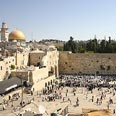
Arab, haredi and Russian get on a plane
As standard of living rises, growing number of Israelis travelling abroad affects all sector. In light of demand, more and more travel agencies launch departments focusing on special vacations for Arabs, Ultra-Orthodox and Russians. Surprising? Perhaps, but it appears to be working
In light of the growing demand for vacations in Israel and abroad, large tour companies have internalized the new needs and most of them now operate special departments focusing on vacations for the ultra-Orthodox, Israel's Arabs and Russians immigrants.
No longer a luxury for rich people only
Israelis' need to take a vacation has already become a cliché. Following the rise in the standard of living, members of the different sectors are joining the trend and turning into important consumers. An amusing example is Kibbutz members who have become enthusiastic consumers of vacation packages, a phenomenon which did not exist before kibbutzim were privatized.
"What was once considered a luxury for rich people only has now become an accessible recreation for members of the low and middle class as well," says Galit Zakai, Eshet Tours' marketing manager.
"In the past, the Israeli used to fly maybe once a year, and it was a big deal for him. The whole family would take part in the celebration and supply him with a detailed shopping list. Today the average Israeli flies abroad three times a year."
As the standard of living has increased and there is more liquid money available, people allow themselves to invest in their leisure culture.
Jordan, Morocco and Tiberias
Ilan Yeshayahu, CEO of the Blue Sky company specializing in tourism for the Arab population, explains that the need for designated departments for the Arab sector stems from its actual entry into the tourism market.
"In the past few years, many have been working in freelance professions and in large companies. The women have entered the labor market and the income has increased. All this strengthened the investment in leisure."
"We provide individual service which meets the sector's needs," Yeshayahu says, explaining why many people turn to his company. One of the major needs in this context is the destinations the sector favors.
"Israel's Arabs like sunbathing vacations," says Yeshayahu. "Therefore, they will mostly look to fly to countries in the Mediterranean Basin, the popular destinations being Antalya, Marmaris, Bodrum and Istanbul. In this aspect there is no difference between them and the Jews – they also like the clubs in Turkey. The only difference is that they travel in large groups, several families together."
The Arabs have recently also discovered Prague and Budapest, which were extremely popular destinations in the tourism market not so long ago and have recently been slightly abandoned. But the greatest difference in the Arab tourism is, of course, the vacations taken in Arab countries like Egypt, Jordan and Saudi Arabia.
"This population prefers short vacations," Yeshayahu explains. "Therefore, they take a lot weekend trips to Jordan, Egypt or Turkey. Eilat and Tiberias are also popular resort towns, and on the Muslim holidays you can find them vacationing there in masses. However, as they are not particularly adventurous tourists, you won't see them travelling to exotic destinations like Thailand."
Naturally, Israel's Arabs are also interested in flights to Mecca, but Yeshayahu says this only takes place after the age of 45. "The older tourists want flights to Mecca, which are not reserved through us but through Jordan, where they arrive with a bus and then take a flight to the Kaaba."
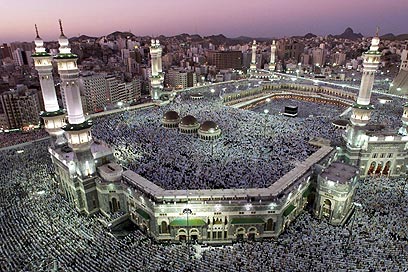
Mecca. Attracts only adults (Photo: Reuters)
Protesting airport harassments
Beyond the favored destinations, there is another characteristic shared by the Arab population – the "harassments" they are subject to at Ben-Gurion Airport.
"They are deeply distressed by this issue," says Yeshayahu. "I have heard numerous humiliating stories of incidents which took place during the pre-flight security checks. It causes a lot of despair and they protest this phenomenon, but they also understand the need and are used to it. There is nothing I can do but express my sorrow over this phenomenon."
In addition, Yeshayahu says, this population is extremely aware of all aspects of the trip. "They bargain constantly and know exactly which hotel to reserve, its location and its level, down to the smallest details. In addition, they like to have everything arranged in advance, and will therefore usually reserve organized tours, deals including a flight and a hotel, or all-inclusive vacations."
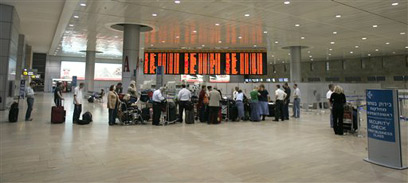
New York, Jerusalem and glatt kosher hotels
Among the haredim there are not many surprises. The favored destinations are New York, Jerusalem and the glatt kosher hotels in the Dead Sea and northern Israel.
The conservative audience, on the contrary, will be more flexible in selecting its vacation destinations, as long as these provide comfortable access to a local synagogue and kosher restaurants. The young ones will even travel to destinations where there is no large Jewish community and tour India and South American countries for long periods of time.
"In Israel, Jerusalem is the most popular destination among the haredi public," says Gal Nagad, a travel agent in Eshet Tours who specializes in the ultra-Orthodox sector. "In the Dead Sea, certain hotels close during the summer and are completely permitted as kosher in order to match the needs of the haredi tourist.
"Eilat, on the other hand, is a much less popular destination, because of what they view as immorality – girls in bikinis and beach parties. They will come there out of season and will therefore receive much cheaper rooms."
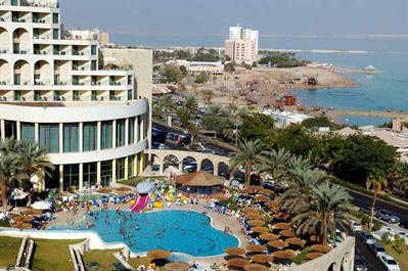
Dead Sea hotels. Permitted as kosher for haredi tourist (Photo: Moshe Milner, GPO)
Na Nah Nahma Nahman Meuman
Nagad discusses the new popularity of flights abroad among the haredi public. In the past, one could only talk about special flights to Belgium and New York to visit the communities, but today Turkey is no longer a no-no.
"Turkey and Greece have become real options for the haredi couple's vacation. These are close destinations where people travel to for short vacations, mainly during Passover or in the summer. They also travel to Turkey to buy a cheap dowry for a wedding."
All this does not take place at the expense of a modest hotel and kosher restaurants. If needed, canned food is taken along.
"Because this public does not usually have internet access, they ask us for all the details – including routes, ticket costs, timetables, etc," says Nagad. "Even if the flight's goal is to console the bereaved or raise funds, all they need is a flight and the rest is organized by the community abroad."
And one cannot ignore the pilgrimage to Uman, which has gained momentum over the past few years.
"To Uman there are airlifts of many religious people and a few seculars. It's not a vacation but rather a kind of spiritual trip with six to seven people sleeping in one room, in private houses rented out by people living near the site.
"The amount of flights leaving for Uman at that time of the year is huge, and therefore people must book about two months in advance in order to guarantee a seat in the flight. Nonetheless, some try to follow the secular public and book last-minute flights, although it's not really profitable."
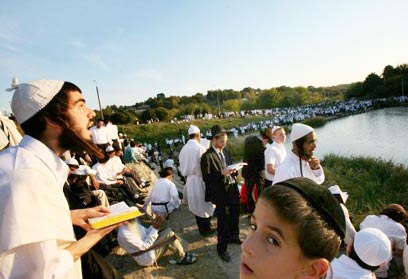
Not everyone likes clubs
When the travel agencies talk about the Russian sector, they are referring to immigrants who came to Israel from the former Soviet Union, who appear to have their own needs in terms of tourism and vacations.
Despite the fact that they have been absorbed in Israel and have waded through bureaucracy, learned how to cut through queues and escape being a "frier" (sucker), Russian immigrants are the product of a cold and distant culture, and this may explain their desire to travel to classic European destinations and stay away from eastern Europe, as well as from the luxurious Turkish clubs.
"The Russian public's most favorite destinations are the super-classic countries in western Europe: Switzerland, Austria and Italy," says Yigal Avni, Eshet Tour's operations manager, an expert in Russian tourism.
"They look for long trips which contain a lot of content and knowledge. They want the guide to provide them with a lot of information and to include museums and nights at the theater and opera."

This may be the reason why the tourism market offers many organized tours accompanied by Russian-speaking guides. Antalya, as mentioned earlier, is not a favored destination.
"The Russians do love sea and sun vacations and definitely travel to Greece, Cyprus and Eilat, but the clubs are their least favorite destinations because they can't relate to the phenomenon of endless food."
Zimmers (wooden cabins) are also not considered a desired place of vacation among the Russian population. "They will usually prefer a luxurious lobby with sparkling marble over a chalet," says Avni. "This public will always favor urban tours over hikes in the nature.
"Another thing characterizing them is trips during the holidays. As opposed to other sectors, they don’t mind spending holidays like Rosh Hashana or Yom Kippur abroad, and as opposed to the general spirit of booking a flight at the last minute, the Russian sector makes sure to reserve the trip in advance."















